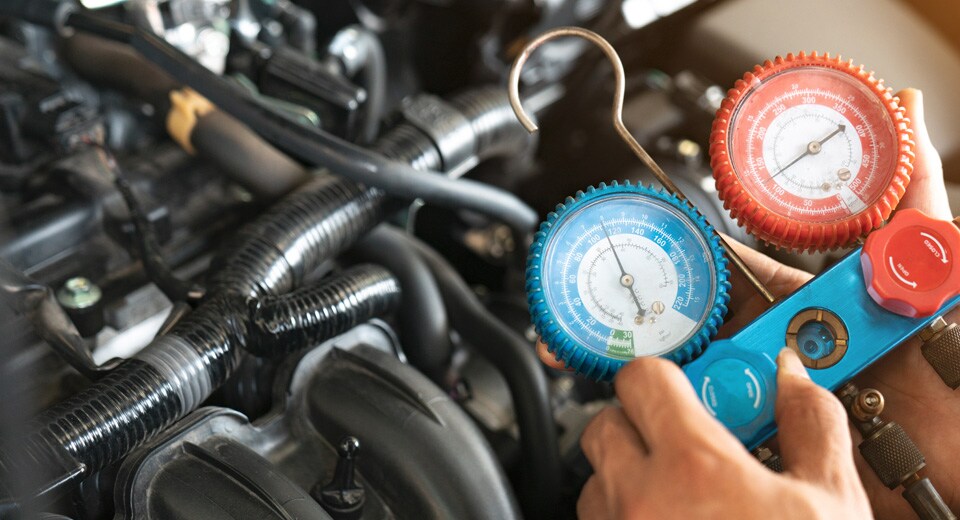 Though West Michigan has gotten a brief reprieve from the summer heat, more warm weather is surely on its way. Driving in a hot car is downright miserable, so if it's been a few years since your air conditioning system has been inspected, or it's just not working as well as it used to, then it's time to come into the Borgman Service Center for an inspection.
Though West Michigan has gotten a brief reprieve from the summer heat, more warm weather is surely on its way. Driving in a hot car is downright miserable, so if it's been a few years since your air conditioning system has been inspected, or it's just not working as well as it used to, then it's time to come into the Borgman Service Center for an inspection.
Though sometimes spotting an issue with your a/c isn't as cut and dry as "it's working or it isn't." In this article, we'll cover how air conditioners work as well as point out signs that it may be time to have your air conditioning system serviced.
How Your Vehicle's Air Conditioning System Works
Using your air conditioner is pretty easy. You push the A/C button, turn the temperature gauge to cool, and select whether to draw in air from outside the vehicle or recirculate the air inside the cabin. Some newer Ford Vehicles may also have dual-zone climate control with thermostats, or separate controls in the back of SUVs. No matter which type of system your vehicle uses, the principles of how the air is cooled remains largely the same. But how does the system take hot, humid air and turn it into chilly, dry air? You might recognize some of these concepts from your high school chemistry class. It's all basic thermodynamics.In essence, what's happening is this: hot, humid air is drawn in from outside, a refrigerant absorbs the heat as it turns from a liquid into a gas, the moisture in the air condenses into water, and the remaining cool dry air is blown into your vehicle. Then, a pump called the compressor pressurizes the refrigerant so this process can start all over again.
The two basic parts of the air conditioning system are the compressor and the condenser. Refrigerants boil at room temperature, so when they're exposed to air coming into the cabin, they suck up heat energy from that air and turn into a gas. A fan blows the resulting cold air into your vehicle and the hot refrigerant gas is returned to the compressor. Here it is pressurized and transformed back into a liquid inside the condenser, which looks a lot like a second radiator. When this happens, the heat it absorbed to become a gas is released back outside. After the pressure is released at the expansion valve, the liquid refrigerant is free to grab more heat and turn back into a gas, and the cycle repeats.
In case you were wondering how the refrigerant changes back into a liquid and releases its heat, this naturally happens when gasses are pressurized. The opposite happens when liquids are depressurized - you can boil water with a strong enough vacuum pump, no heat required! Boiling is actually when a liquid's molecules have enough energy to break free from surrounding molecules - turning from a liquid into a gas. Heating a liquid adds this required energy while lowering the pressure lowers the amount of energy needed.
How Do I Know When There Is A Problem With My Air Conditioning?
Now that we've covered the basics of how your vehicle's air conditioner works, you're probably already thinking of how different pieces of the system not working would present themselves.For instance, if your a/c is only blowing cold air on the highway, your condenser probably isn't getting enough airflow. It could be that the metal fins are bent, or it's clogged with dead bugs or other detritus.
It could be that you do get cold air, but it's not very cold at all. In this case, it's possible that you have a refrigerant leak, and need to take it into the Borgman Service Center as soon as possible. The gasses inside older air conditioners destroy the ozone layer, and the newer ones are powerful greenhouse gasses. Do not use the a/c recharge cans from the auto parts store - refrigerant gas is very harmful to breathe, and illegal to discharge into the environment.
If your air conditioning doesn't work at all, it could be your compressor, but our team of highly-trained technicians will be able to find the cause and keep you informed while we make repairs. If you are having a different problem with your a/c, we can help you find and fix the issue there as well.
Normal Things Air Conditioners Do That May Look Like Issues
Sometimes, you might see your vehicle's air conditioner doing things that look like issues but aren't issues at all.The most common non-issue we get asked about is, "why does smoke or steam come out of the air conditioning vents?" While this might look alarming, we assure you it's completely normal. Cold, dry air is meeting the hot humid air inside your vehicle and causing it to condense. This is actually how clouds form, and nothing to worry about. However, if the vapor lingers or smells like something is burning, it's worth calling us at the Borgman Service Center.
The other thing you might notice on a particularly humid day is a large puddle under your parked vehicle after a drive. If you blot the puddle with a paper towel, you'll likely see this is just water. As the hot humid air is cooled in the air conditioner, moisture is drawn out of the air, condenses into water, and is drained out of the vehicle. It's the same concept as a cold soda can sweating in the heat. However, if you're noticing the interior carpet getting damp while running the air conditioner, those drains are clogged and need to be cleared out. The carpets should also be thoroughly cleaned before mold forms.

Have Your Air Conditioner Inspected at the Borgman Service Center in Grand Rapids, MI
If your air conditioning isn't blowing cold air the way it used to, or you're getting ready for your next adventure in West Michigan and want to be prepared, schedule an appointment with the Borgman Service Center today. Our friendly and highly-trained service technicians will inspect your air conditioning system for leaks, airflow, and problems with the electronics and report back our findings with an easy-to-understand report.As always, if you have any questions during your visit, our service advisors are here to help you make informed decisions about your vehicle. Come see why we're the Best in the West!